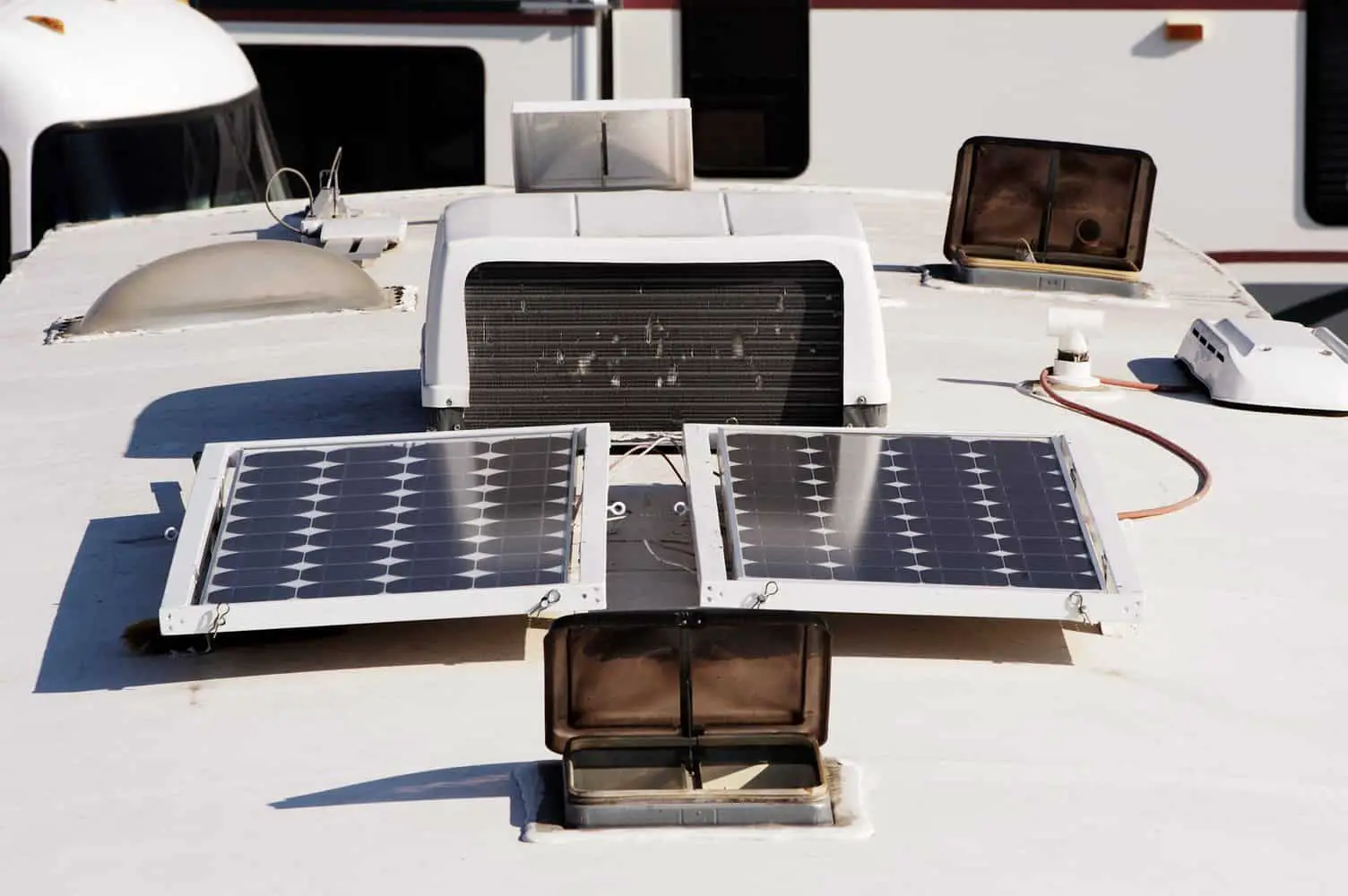Even if you don’t plan on doing a lot of boondocking, solar panels are an invaluable addition to the camping experience. After all, you embarked on this journey in order to get in better touch with the wilderness, and getting off the grid is a fabulous way to do it.
For your convenience, we’ve compiled this list of the best solar panels for RV and campers.
1.WindyNation 100W Solar Panels -Best Overall
2. Eco-Worthy 100W Portable Solar Panels -Best For Budget Shoppers
3. Zamp Legacy Series 90-Watt Portable Solar Panels -Best User Friendly
4. Renology 400W Solar RV panels – Best Quality And Durability
5. HQST 100W 12V Solar Panels – Best Polycrystalline Version
6. TP-Solar 100W 12V Solar Panels – Best For Smaller RV’s
The Best Solar Panels For RV And Campers: Product Review Guide

 1. WindyNation 100W Solar Panel Kit
1. WindyNation 100W Solar Panel Kit
If you can’t get your hands on a Zamp, look for the WindyNation 100W Solar Panel With Kit. It’s set at a slightly higher price point, but it also comes with a higher wattage and an AGM 12V deep cycle battery. The knowledge that you’ll be purchasing all the components in one tidy package takes some of the sting out of the initial sticker shock.
Depending on how much sunlight you get, the unit can deliver up to 350 watt hours of energy. The charge controller comes with built-in overload protection for peace of mind. We find the charge controller to be fairly difficult to read at first, but it’s effective once you get the hang of it.
| Cell Structure | Panel Output | Charge Controller | RV Battery |
| Polycrystalline | 100W | 30A PWM | AGM Deep Cycle 12V |
2. Eco-Worthy 100W Portable Solar Kit
If cost is a major concern for you, we would recommend the Eco-Worthy 100W Portable Solar Kit. The price is so low, the kit will pay for itself after just a few nights’ worth of saved campsite fees. Moreover, it’s a lightweight, foldable solar panel thats easy to transport, complete with a built-in handle. While there’s no RV battery included in the kit, the controller is pre-wired for a 12V model.
On the negative side, we find the charge control panel to be slightly rudimentary, and the lack of a separate disconnect cable means you have to uncover the battery box for every operation. The polycrystalline structure takes away a few points in the efficiency department.
On the whole, though, we would feel comfortable recommending the Eco-Worthy Foldable Solar Panel Kit for RVers on a tight budget.
| Cell Structure | Panel Output | Charge Controller | RV Battery |
| Polycrystalline | 100W | 20A PWM | Not Included |
3. Zamp Solar Series 90-Watt Portable Solar Panel
The Zamp Solar Legacy Series 90-Watt Foldable Solar Panel is our popular favorite in almost every category.
While Zamp products can be pricey, the relatively low wattage of this one keeps it in a more affordable range. Although it has only a 90-watt capacity, it’s powerful enough to last through a weekend without sun when fully charged, depending on which appliances you decide to run during that time.
The monocrystalline cell structure helps boost its efficiency, and the charge time is relatively quick.
Even if you’ve never before installed a solar panel, Zamp’s instructions will make the job a cinch. A sturdy carrying case protects the panels when they’re not in use.
| Cell Structure | Panel Output | Charge Controller | RV Battery |
| Monocrystalline | 90W | 10A, PWM | Not Included |
4. Renology 400W Solar RV Kit
For maximum solar power, consider the Renology 400W Solar RV Kit. Renology is one of the top names in the RV solar panel game, with a reputation for quality and durability that’s well-represented here.
This model includes four 100-watt monocrystalline panels capable of delivering at 21 percent cell efficiency. This makes it a good choice for serious boondockers who want to be able to power all of their appliances while camping off the grid.
The design is sleek and appealing, too, with a sturdy frame that’s built to withstand the elements. While the panels perform at maximum power in full sunlight, the kit is outfitted with a bypass diode that increases its efficiency even in the shade.
| Cell Structure | Panel Output | Charge Controller | RV Battery |
| Monocrystalline | 400W | 30A PWM | Not Included (compatible with flood, gel, or AGM units) |
5. HQST 100W 12V Solar Panel Kit
Another alternative is the HQST 100W 12V Solar Panel Kit, especially if your looking for this Polycrystalline version.
With an average daily output of just 500 watt hours, it’s not the most powerful unit we’ve listed, but it’s definitely one of the most affordable ones. Installation and operation are simple, even for first-timers.
Although the LCD readout on the charge controller is easy to read, the symbols on the case are confusingly small. Fortunately, the instructions do an admirable job of explaining which terminals are which.
| Cell Structure | Panel Output | Charge Controller | RV Battery |
| Polycrystalline | 100W | 20A PWM | Not Included |
6. TP-Solar 100W 12V Solar Panel Kit
If you’re in the market for an affordable yet exceptionally durable model, then this offering from TP-Solar could be the one for you. Because of its diminutive size, it’s also a good fit for smaller RVs.
The panel is dustproof as well as weatherproof, designed to hold up to decades of use. Considering its relatively low price tag, the 19.5 percent cell efficiency is particularly impressive.
The crystal-clear LCD readout on the control panel is another plus. This kit is compatible with 12V and 24V batteries, but you’ll have to purchase those separately. Also note that the solar system can be expanded to accommodate more panels for a maximum wattage of 400.
| Cell Structure | Panel Output | Charge Controller | Battery |
| Monocrystalline | 100W | 20A PWM | Not Included |
Choosing The Best Solar Panels
Why Do I Need Solar Panels?
When you install solar panels on your camper or RV, you’ll be able to harness the energy provided by sunlight. The best versions are equipped with high-grade cells, which work efficiently enough to provide energy even when the weather is overcast.
What does that mean, exactly? To put it simply, the efficiency of solar panels is measured by their ability to transform sunlight into solar power. A panel with higher-grade cells will be able to provide more energy than one with low-grade cells, even if the sun were to shine on the two for the same amount of time. Solar panels should operate at about 15 percent efficiency, but the top-rated brands can go above 20 percent.
What Are Solar Panels Made Of?
Silicon is the base material for solar panels. Their performance depends largely on the quality of the material, as well as the design.
There are two basic types of silicone used in the construction of solar panels: monocrystalline, which uses crystals cut from a single source; and polycrystalline, composed of crystals from various silicone structures. The purity of the monocrystalline version makes it more efficient than polycrystalline. As a result, the latter is often less expensive.
What does this mean for you? If you’re planning to camp when there are fewer daylight hours, then a high-grade monocrystalline structure is likely your best bet. Casual RVers who confine their camping activities to the summer months, meanwhile, might be just as happy with a cheaper alternative.
Other Important Considerations
In addition to the silicone structure, you’re bound to come across the following terms while shopping for solar panels. Here’s what you need to know about each of them.
Charge Controller
Because the energy produced by solar panels arrives in slow drips and sudden surges rather than a steady trickle, it needs a go-between to keep things moving. That’s where the charge controller comes in.
These units serve as moderators for the solar energy supply, keeping the batteries from becoming overloaded. By regulating the strength of the power surges, they’re able to maintain the charge level of the batteries, thereby ensuring a safe and steady stream of energy.
If you’re investing in a solar kit, a charge controller should be included in the package. Most modern brands will advertise Pulse Width Modulation (PWM), a form of technology that allows the panel to regulate the pulses on its own, instead of being operated manually. Nevertheless, it’s best if the controller also provides a manual override option, just in case.
Battery
A deep cycle 12V or 24V battery is essential when it comes to efficient solar panel operation. Without this battery, you won’t be able to store the energy to use later. Here’s the rundown on the three different types of deep cycle battery:
Flood—high peak draw, but require frequent cycling and maintenance
Gel—Expensive and often difficult to charge
Absorbed Gas Mat (AGM)—Versatile, good in rapid discharge situations, found in many RVs
Watt Rating
The watt rating lets you know how much solar power the panel is capable of generating under peak sunlight conditions. The number is calculated by multiplying the number of amps by the number of volts. While 400W is considered ideal for home use, a rating of 100W is generally adequate for RVs and campers.
In Conclusion
With the right RV solar panel, you can enjoy your time on the road without having to worry about finding a charging station. If you’re the type of camper who prefers to go off the beaten path, rather than sticking to crowded campgrounds, a solar panel kit is a must.
Best of luck, and may you have many sunny days ahead!
Check out our article on: Best RV Surge Protector For 2021


